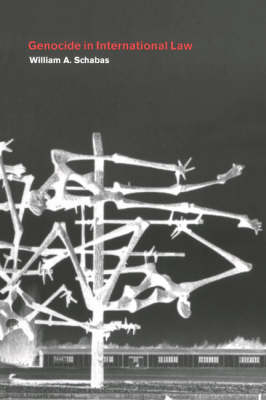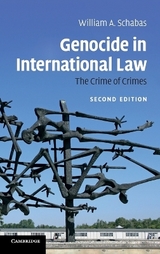
Genocide in International Law
The Crimes of Crimes
Seiten
2000
Cambridge University Press (Verlag)
978-0-521-78262-3 (ISBN)
Cambridge University Press (Verlag)
978-0-521-78262-3 (ISBN)
- Titel erscheint in neuer Auflage
- Artikel merken
Zu diesem Artikel existiert eine Nachauflage
The provisions of the 1948 Genocide Convention are now being interpreted in important judgements throughout the world. In this definitive work William A. Schabas examines the concept of protected groups, the quantitative dimension of genocide, problems of criminal prosecution and international judicial cooperation, and the international duty to prevent genocide.
The 1948 Genocide Convention has suddenly become a vital legal tool in the international campaign against impunity. The succinct provisions of the Convention are now being interpreted in important judgements by the International Court of Justice, the ad hoc Tribunals for the former Yugoslavia and Rwanda, and a growing number of domestic courts. In this definitive work William A. Schabas focuses on the judicial interpretation of the Convention, debates in the International Law Commission, political statements in bodies like the General Assembly of the United Nations, and the growing body of case law. Detailed attention is given to the concept of protected groups, to the quantitative dimension of genocide, to problems of criminal prosecution including defenses and complicity, and to issues of international judicial cooperations such as extradition. He also explores the duty to prevent genocide, and the consequences this may have on the emerging law of humanitarian intervention.
The 1948 Genocide Convention has suddenly become a vital legal tool in the international campaign against impunity. The succinct provisions of the Convention are now being interpreted in important judgements by the International Court of Justice, the ad hoc Tribunals for the former Yugoslavia and Rwanda, and a growing number of domestic courts. In this definitive work William A. Schabas focuses on the judicial interpretation of the Convention, debates in the International Law Commission, political statements in bodies like the General Assembly of the United Nations, and the growing body of case law. Detailed attention is given to the concept of protected groups, to the quantitative dimension of genocide, to problems of criminal prosecution including defenses and complicity, and to issues of international judicial cooperations such as extradition. He also explores the duty to prevent genocide, and the consequences this may have on the emerging law of humanitarian intervention.
Introduction; 1. Origins of the legal prohibition of genocide; 2. Drafting of the Convention and subsequent normative developments; 3. Groups protected by the Convention; 4. The physical element of the offence of actus reus; 5. The mental element of the offence or mens rea; 6. 'Other acts' of genocide; 7. Defences to genocide; 8. Prosecution of genocide by international and domestic tribunals; 9. State responsibility and the role of the international court of justice; 10. Prevention of genocide; 11. Treaty law questions and the Convention; Conclusion.
| Erscheint lt. Verlag | 31.8.2000 |
|---|---|
| Verlagsort | Cambridge |
| Sprache | englisch |
| Maße | 160 x 235 mm |
| Gewicht | 1108 g |
| Themenwelt | Recht / Steuern ► EU / Internationales Recht |
| Recht / Steuern ► Öffentliches Recht ► Völkerrecht | |
| ISBN-10 | 0-521-78262-7 / 0521782627 |
| ISBN-13 | 978-0-521-78262-3 / 9780521782623 |
| Zustand | Neuware |
| Haben Sie eine Frage zum Produkt? |
Mehr entdecken
aus dem Bereich
aus dem Bereich



